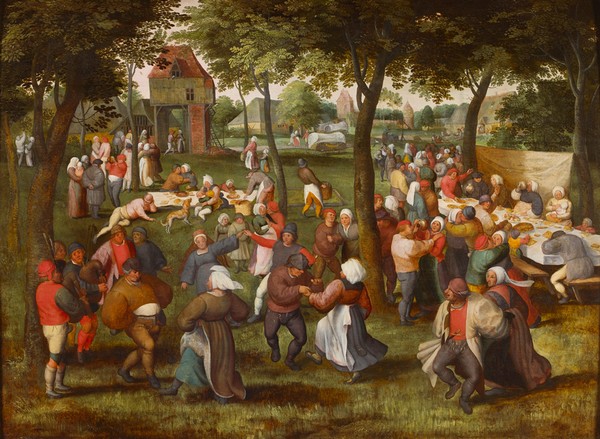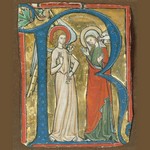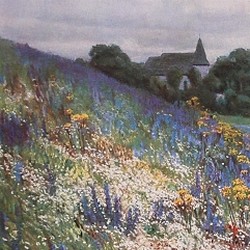
At a slow pace we arrived at the second part of Dichterliebe. Not only because we're listening to the ninth song out of sixteen, but because there is a point of inflection in the love story: if the poet still had some hope left, it vanishes at this song, where his beloved gets married.
Das ist ein Flöten und Geigen, Heine's poem, tells us about the wedding in present tense, and the verbal form invites us to participate in a more direct way than the past tense would do; of course, Schumann's music isn't unaware of the poet's choice, and also takes us to the party, to the wedding dance. It doesn’t happen to you sometimes that you visualize the songs? (Please tell me it does!) In this one, I can see the wedding party in the distance: the banquet table, the small orchestra, and people dancing. There is also the poet watching, half-hidden behind a tree. We hear him speaking (that is, singing) over the music of the party but, in fact, we don't hear the music as the dancers do; we hear it altered by the poet's feelings. I'm not sure I'm making myself clear, but I think that listening to the accompaniment of the song might help:
The bride and the groom are dancing a ländler (we talked about this dance two weeks ago) or a similar dance, but we don't listen to a festive dance, it has something strange and disturbing: The motif we hear at the beginning is obsessively repeated throughout the song, the music gets accelerated, the piano plays without pause and the minor tone tinges everything with sadness. And the music whirls round and round until it breaks out in a very long postlude. The accompaniment has an important role in this lied; after listening it without the voice, we realize that it could be a piano solo piece.
And the voice? It also takes part in agitation, and it does so in a very peculiar way; I'm not able to share a cappella recording, so we should make an effort to mentally isolate it from the accompaniment. Whenever I listen to this Lied I feel as if the vocal line is independent of the piano (and, needless to say, it’s just a feeling, intended or not by Schumann); this reinforces my perception that the poet is speaking. In addition, it's a somehow unpleasant vocal line. To begin with, the score indicates many changes of dynamics: the first verse is mezzoforte, the second forte, the third and fourth, piano; in the second stanza, the first verse is piano, but it's repeated in forte, and the last two verses are again piano. In addition, the duration of the notes changes a lot in the same phrase, and the pattern is repeated (again, the obsession); besides, the vocal line has considerable interval leaps. Altogether, we can say that the poet is upset. No wonder, his beloved just got married, but I think it's really interesting the way Schumann describes it.
The poet is upset, we know that but, what does he feel? Pain, sadness, anger, the bitterness he denied two songs ago? Maybe a little bit of everything? Or even, as some people suggest, he drowned his sorrows in beer? It depends on the performers, of course, on their nuances, but also on a very obvious matter: the tempo they choose. The score indicates "nicht zu rasch" [not very fast], but these indications are always relative, and we find up to thirty seconds of difference between the fastest and the slowest versions, which is a huge, unusual difference for such a short song.
After listening to many, many versions of Das ist ein Flöten und Geigen (you know, life is hard), I have chosen two, with completely opposite tempi. The slow one is that of Simon Keenlyside and Malcolm Martineau; in my opinion, sadness and disillusionment predominate, in keeping with their Ich grolle nicht, which we listened when we spoke of this song. The fast one is that of Julien Prégardien and Eric Le Sage, which exudes bitterness; I jotted down to have them back for one of the remaining lieder to see how their cycle evolves.
Listen to both versions, and choose, if necessary.
Das ist ein Flöten und Geigen,
Trompeten schmettern darein;
Da tanzt wohl den Hochzeitsreigen
Die Herzallerliebste mein.
Das ist ein Klingen und Dröhnen,
Ein Pauken und ein Schalmei’n;
Dazwischen schluchzen und stöhnen
Die lieblichen Engelein.















